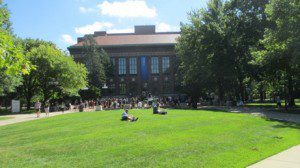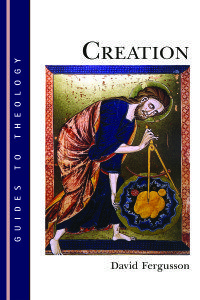 Joel Duff at Naturalis Historia has a blog well worth following. As a biology professor and a thoughtful Christian his insights are worth reading. His post earlier this week Testing Book-smarts with Observation is a great example. Here he poses a question:
Joel Duff at Naturalis Historia has a blog well worth following. As a biology professor and a thoughtful Christian his insights are worth reading. His post earlier this week Testing Book-smarts with Observation is a great example. Here he poses a question:
Should professors at Universities be active participants in generating and testing ideas or should they be content to be teachers of what is already known? Most higher educational institutions, such as the one that employs me, continually grapple with how to strike a balance between encouraging knowledge creation and dissemination of past knowledge.
Put another way, am I primarily a knowledge generator or am I paid solely to facilitate the communication of knowledge, with the assumption it is correct, once passed to me onto the next generation? How my university administration answers that question may go a long way toward determining my job responsibilities, such as teaching load, and what future hires will look like. More bluntly, if professors are just book-smart knowledge-dissemination vehicles then there is no need to hire tenure-track research faculty when adjunct faculty and lectures at reduced salaries and higher student contact-hours will suffice.
A university may choose to go the route of just being in the business of teaching past knowledge to future generations but at what cost?
There is a very real danger in becoming complacent with current knowledge. As humans we were not created to stand still. In Genesis 1:26-28 humankind created in the image of God is given dominion and commanded to be fruitful and multiply, fill the earth and subdue it. In some respects the Bible contains a story of growing pains as humans, from Adam and Eve onward, fail to carry out their God given vocation and calling faithfully.
Taking the theme of Joel’s post in a slightly different direction, we are not called to stand still as Christians either, content with current knowledge. Each new generation must wrestle with the Christian faith and theology afresh, standing on the shoulders of those who came before, but in the context of new and changing challenges. We have to test our “book smarts” with observation and life … and sometimes we need to test our “book smarts” by returning to The Book and reading it from a fresh perspective. (Certainly Luther and Calvin did this, as have others in church history – this isn’t a completely new idea.) Theology isn’t a discipline immune to error. If nothing else, two thousand years of church history should have taught us this.
Do we need knowledge creators in the church or just dissemination of past knowledge?
What is the right balance? How do we know?
 One place where we may need revitalization is in the area of Creation. David Fergusson, professor of divinity and principal of New College at the University of Edinburgh recently published a short book Creation in the series Guides to Theology. This series is intended to provide an introduction to fields in theology for students as well as pastors, church leaders, and theologians. This is a timely volume – “Creation,” as Fergusson starts his book, “has reemerged as a major topic of theological inquiry in recent times.” This is pushed by science in our day, but should not be viewed as a salvage game – making space for faith in the twenty-first century where science reigns supreme. Rather it is an opportunity to dig more deeply into a robust theology of creation.
One place where we may need revitalization is in the area of Creation. David Fergusson, professor of divinity and principal of New College at the University of Edinburgh recently published a short book Creation in the series Guides to Theology. This series is intended to provide an introduction to fields in theology for students as well as pastors, church leaders, and theologians. This is a timely volume – “Creation,” as Fergusson starts his book, “has reemerged as a major topic of theological inquiry in recent times.” This is pushed by science in our day, but should not be viewed as a salvage game – making space for faith in the twenty-first century where science reigns supreme. Rather it is an opportunity to dig more deeply into a robust theology of creation.
An overriding conviction is that the doctrine of creation has suffered from inadequate exposure in the history of the church because it has too long been merely the stage for the enactment of the theology of sin and redemption. A wider space now needs to be excavated within which it can be more fully articulated. This might achieve a greater theological balance that can generate some ethical, pastoral, and liturgical gains for the benefit of the church in the world today. (p. 1)
Creation narratives in scripture do not simply set the stage for the action that follows. The overarching theme is more a doctrine of God as creator than a doctrine of creation. Creation and covenant are closely related – God is always active in his creation and in relationship with his people.
The creator’s activity continues in nature and history, achieving its end only with the making of a new world. There is no suggestion here of a creator who “lights the blue touch paper” and then retires. The world is one in which the creator continues to be present and active. (p. 4)
The brings a new understanding to this work of God present and active in creation. The New Testament portrays a “cosmic Christology” (John 1:1-5,14, 1 Cor. 8:6, Colossians 1:15-20, Hebrews 1:1-4). Creation is Christ-centered:
First, the origin and final purpose of the cosmos is disclosed with the coming of Christ into the world and his resurrection from the dead. Second, the significance of Christ is maximally understood by reference to his creative and redeeming power throughout the entire universe. (p. 8)
Sometimes fresh understanding comes from looking back (after all many devout thinkers have wrestled with this before).
Writers at different periods in the history of the church would later use this cosmic Christology to describe the appearance of the incarnate Christ as the crowning moment of history. No longer understood merely as an emergency or secondary measure to counteract the effects of sin and evil, although this remained an integral feature, the incarnation was the fulfillment of an eternal purpose. (p. 8)
In both the New and Old Testaments the doctrine of creation is not a philosophical (or scientific) hypothesis about how the world came into being. It is a theological doctrine “set within the circle of faith.” Fergusson outlines four features of a theology of creation.
1. It shapes an account of the God-world relationship.
By the word of the Lord the heavens were made, and all their host by the breath of his mouth. (Psalm 33:6) And Genesis 1 presents the creation of the world “majestically by a series of divine commands. … God speaks and it is accomplished.” (p. 3) The world is created, not divine. Many Psalms and other passages provide insight into the majesty of God’s creative act. But along with God’s transcendence there is covenant, fellowship, and relationship.
2. The goodness of the world is affirmed.
Genesis 1 and the Psalms testify to the beauty and ordering of creation. “Even while it is the arena of decay, suffering, and sin, this world remains God’s good creation.” (p. 9)
3. Creation is imperfect and incomplete.
The making of the world is only the first of God’s works. As a beginning of a history, it sets in motion a narrative that has a focal point in the coming of Jesus. … God’s creative work is ongoing throughout the history of Israel and the church, even embracing resistance and struggle in its dealing with people and natural forces. Yet this work of renewal embraces rather than abandons creation. (p. 9)
In other sections Fergusson notes that with the serpent (an ancient near eastern symbol of evil) in the garden “the presence of evil already seems to menace creation.” (p. 4) And this before any human sin enters the story. From the presence of the serpent in the garden it seems clear; “The Bible does not explain why there is evil, but proclaims its defeat by God.”(p. 11) This is also a place where science may be driving us to question preconceptions – what it means to call creation good in Genesis 1. We need to do more than simply disseminate past knowledge.
4. The expression of creation is a doxological act.
Our proper response to creation is praise. The heavens declare the glory of God, and as we marvel in creation there is an undeniable sense of awe, celebration and praise.
Three of the features Fergusson identifies are (or should be) uncontroversial. On the other hand, the idea that creation is, and was from the beginning, incomplete and imperfect runs counter to what many believe. John Walton’s recent book The Lost World of Adam and Eve makes a similar argument. The biblical accounts don’t depict a perfect ordering of creation, but rather a world where there is non-order remaining and a continuing creation of order. Sin is disruptive, but it is not the root cause of all natural disorder in the world.
What would you add to Fergusson’s four features?
What would you question?
If you wish to contact me directly you may do so at rjs4mail[at]att.net.
If interested you can subscribe to a full text feed of my posts at Musings on Science and Theology.











